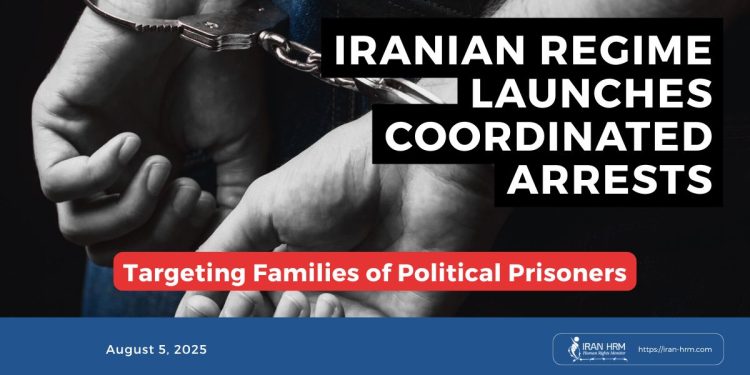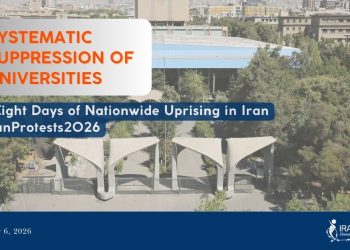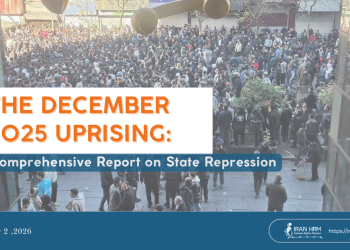Introduction
In the face of escalating political and economic crises, the ruling regime in Iran has launched a systematic campaign of arrests of former prisoners, and supporters of the Iranian Resistance, and—most notably—targeting their family members. This report documents an alarming and organized pattern of repression aimed at silencing dissent, intimidating the public, and preventing future uprisings. The arrests, beatings, interrogations, and solitary confinement of individuals—many of whom are elderly or have no recent political activity—constitute serious human rights violations and raise grave concerns about crimes against humanity.
Factual Account: Documented Cases of Arbitrary Arrests
- Moazzami Goudarzi Family (Borujerd)
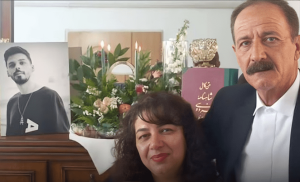
In July 2025, the regime’s agents twice raided the home of political prisoner Farzad Moazzami Goudarzi in Borujerd.
– On July 21, at least 17 security agents entered without a judicial warrant, beat the family, and arrested his mother Leila Saremi and father Ahmad Moazzami Goudarzi.
– Leila was taken to the Tircheh Block detention facility and held in solitary confinement with no legal access
– On July 29, security agents attempted to arrest Rozita Moazzami (Farzad’s sister). Since she wasn’t home, officials stated that Leila would remain detained until Rozita surrendered, a clear case of state hostage-taking.
Leila is the daughter of Ali Saremi, a veteran political prisoner executed in 2010. Farzad is also the cousin of Reza Moazzami Goudarzi, a protester killed in the November 2019 uprising.
- Mohammad Benazadeh Amirkhizi – Age 79 (Qom)
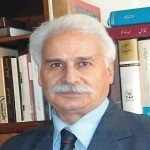
On July 27, 2025, Mohammad Banazadeh Amirkhizi, a 79-year-old former political prisoner, was arrested and transferred to solitary confinement at the Ministry of Intelligence detention center in Qom. He suffers from prostate cancer and other chronic conditions. His siblings, Ali and Sakineh Amirkhizi, were executed in the 1980s for their resistance activities. Mohammad has been imprisoned twice before: from 2008 to 2013 and from 2017 to 2022, both for alleged ties to the PMOI.
- Amirhossein Keshvarifar – Age 20 (Khorramabad)
On July 20, 2025, student Amirhossein Keshvarifar was arrested during a home raid in Khorramabad. He refused to unlock his phone and was taken without a warrant. He is the nephew of Mohammad and Mehdi Khodakarami, who were arrested in March 2023 and sentenced to 8 and 4 years in prison respectively, for alleged membership in the PMOI.
- Hossein Asemaninejad – Age 64 (Kiashahr, Gilan)
Former political prisoner from the 1980s and current rideshare driver. Arrested on July 1, 2025, without legal justification.
- Hamidreza Maki – Age 68 (Mehrshahr, Karaj)
A mold technician and former 1980s prisoner, arrested on June 28, 2025, at his home. His brother Majidreza Maki is currently imprisoned in Fashafouyeh Prison.
- Morteza Asadi – Age 47 (Tehran)
PhD in political science and former university lecturer. Arrested on June 21, 2025. Previously detained in 2009 and 2019.
- Nader Teimouri (Sorkheh Hesar, Tehran)
Former prisoner from 1980–1988 and witness to the 1988 prison massacre. Arrested on June 21, 2025, at his private residence.
Nationwide Political Arrests: A Pattern of Preemptive Control
Across dozens of cities in Iran, widespread arrests have targeted former activists, university students, social media users, and even teenagers
One such case is Shahin Zoghitabar, a 38-year-old former political prisoner, who was arrested on July 23, 2025, in a night raid by IRGC intelligence forces and taken to an undisclosed location.
These arrests, often conducted without judicial warrants and accompanied by threats and psychological torture, are part of a broader state policy of suppression and manufactured fear. The objective: to create a security-dominated atmosphere that prevents the reorganization of popular protests and grassroots movements.
Legal Analysis
The actions taken by the ruling regime in Iran violate multiple articles of the International Covenant on Civil and Political Rights (ICCPR), to which Iran is a state party:
– The arrest of Leila Saremi as leverage to force her daughter’s surrender constitutes collective punishment and hostage-taking, directly breaching Article 9 (protection from arbitrary arrest) and Article 10 (treatment with dignity of persons deprived of liberty).
– The repeated arrest of elderly and ill individuals such as Mohammad Banazadeh Amirkhizi also violates the right to health and humane treatment under Articles 7 and 10.
– Warrantless night raids, denial of legal representation, and incommunicado detention further contravene due process rights under Articles 14 and 17.
These patterns point not only to individual rights violations, but also to systematic repression; raising the concern of state crimes under international law.
Human and Social Impact
The regime’s systematic targeting of political prisoners’ families is not just about silencing individuals; it is about instilling multi-generational fear. Families like the Moazzami Goudarzis represent a disturbing trend:
Repression is no longer personal; it’s hereditary.
By arresting mothers, threatening siblings, and detaining elderly relatives, the ruling regime aims to send a chilling message: If you resist, your entire family pays the price.
This policy disrupts social trust, weakens solidarity networks, and spreads psychological trauma beyond the prison walls. The goal is clear: to dismantle not just political opposition, but also the social fabric that sustains it.
Conclusion and Call to Action
The current wave of arrests; targeting families of political prisoners, former dissidents, and young supporters follows a dangerous trajectory reminiscent of the 1988 massacre and the mass executions of the 1980s. The regime is once again using collective punishment and preemptive repression to crush dissent.
UN Special Rapporteur Javaid Rehman, in response to the execution of Mehdi Hassani and Behrouz Ehsani, warned that Iran is once again on the path of state-sponsored crimes. Mai Sato, UN Human Rights Council delegate, has also expressed concern about this pattern of family-based arrests and political executions. Amnesty International has called for investigation into this crackdown as a possible crime against humanity.
We call on the United Nations Human Rights Council to:
– Establish a Special Fact-Finding Mechanism to investigate the arrests documented in this report;
– Refer the regime’s human rights record to the UN General Assembly and international accountability bodies;
– Urgently dispatch the UN Special Rapporteur on Iran to investigate specific cases detailed herein.
Silence in the face of this escalating policy is complicity in a slow-burning atrocity. Now is the time to act; before repression turns into another mass crime.

